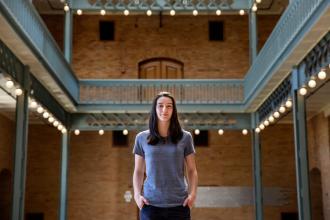If Leyla Kabuli, a gifted musician and tech whiz, sets the bar for winning UC Berkeley’s highest honor for a graduating senior, future contenders for the University Medal may find themselves shooting for the moon.
At 7, Kabuli began mastering the piano. At 10, she was accepted to the pre-college division of the San Francisco Conservatory of Music with a scholarship, where she studied piano, violin, bassoon and chamber music.
In junior high, she played violin with the UC Davis Symphony. In high school, she played piano, harpsichord, celeste and organ with the San Francisco Symphony Youth Orchestra.
And that’s before she got to UC Berkeley on a prestigious Regents’ and Chancellor’s scholarship and directed her laser focus to electrical engineering and computer sciences (EECS).
By her senior year, she was fielding offers of full graduate fellowships from Berkeley, Stanford and MIT. She’s sticking with Berkeley for graduate school.
“I might be biased, but Berkeley has the best electrical engineering program in the country,” says Kabuli, who was born in Berkeley and raised in Davis, California.
She also credits the campus’s culture, diversity and grit for her decision to accept the Berkeley Fellowship for Graduate Study, which provides financial support for five years.
As top graduating senior, Kabuli, 21, a simultaneous degree student in EECS and music, with a perfect 4.0 GPA, will speak this Saturday, May 15, to thousands of her peers, in cap and gown, at a campus-wide virtual commencement ceremony.
The 150-year-old University Medal recognizes a graduating student’s outstanding research, public service and strength of character, and comes with a cash prize.
Kabuli’s research interests lie in diagnostic imaging, vision and perception. Among other things, she’s experimenting with super-resolution microscopy and magnetic particle imaging to help people in the medical profession get a better look inside the human body.
On a lighter note, she’s using the diverse tools of engineering and computer science to enhance the visual 3D entertainment experience.
“Simply put, I want to contribute to technology that’s going to improve the quality of people’s lives,” she says.
